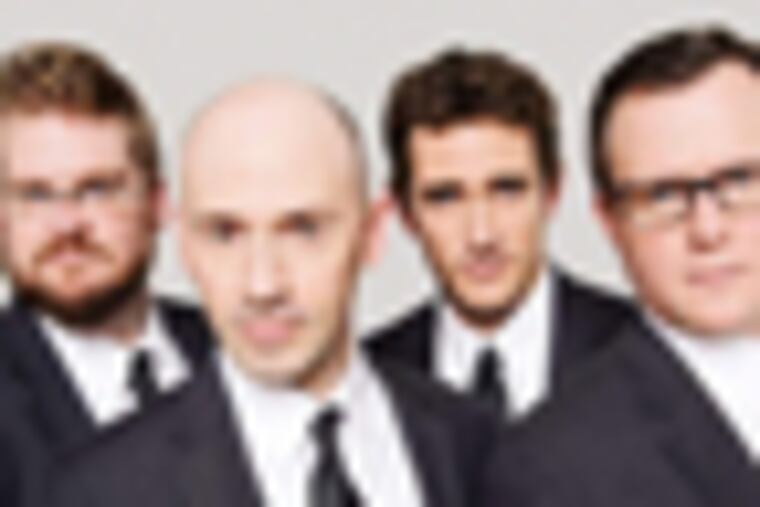New old music from a ‘vocal string quartet’
Most Renaissance-era choral recordings are sold with ancient saints on the cover. Instead, New York Polyphony presents itself on its new disc, endBeginning, with a photo of a demolished church interior. The aftermath of an earthquake? One of New York Polyphony’s concerts? This urban, four-voice, all-male group isn’t out to wreck anything. But its concert Monday night at Friends’ Central School in Wynnewood isn’t likely to be ethereal by the usual early-music standards, either, even with a program of 16th-century Renaissance masters such as Antoine Brumel and Francisco Guerrero. The second half, in particular, features music Henry Purcell might have written, as one member put it, “on a barroom napkin.”

Most Renaissance-era choral recordings are sold with ancient saints on the cover. Instead, New York Polyphony presents itself on its new disc, endBeginning, with a photo of a demolished church interior. The aftermath of an earthquake? One of New York Polyphony's concerts?
This urban, four-voice, all-male group isn't out to wreck anything. But its concert Monday night at Friends' Central School in Wynnewood isn't likely to be ethereal by the usual early-music standards, either, even with a program of 16th-century Renaissance masters such as Antoine Brumel and Francisco Guerrero. The second half, in particular, features music Henry Purcell might have written, as one member put it, "on a barroom napkin."
Not that the group is boisterous. New York Polyphony identifies itself less as an oracle from the 16th century and more as group that sings music that's both extremely old and brand new, with a robust modern edge.
"We think of ourselves as a vocal string quartet," said bass Craig Phillips.
But it's no typical quartet. "A viola, cello, and two double basses," said countertenor Geoffrey Williams.
"One of our missions is to drag the early-music repertoire kicking and screaming into traditional chamber-music-consuming audiences," Phillips said. "When we mention the string quartet thing, it's interesting to see lightbulbs going on inside people's heads."
It's kind of a guy thing. Overt, operatic emotionalism — and the covert audience manipulation that goes with it — is not for them. And when they talk about not having an agenda, that extends from religious messages to the claims of performance authenticity by so many groups that have come before them, such as Gothic Voices and the Hilliard Ensemble. They acknowledge standing on distinguished shoulders. "But you can encounter very studied, very precious, highly ornate performances that can lack body," Phillips said.
Certainly, few preconceived notions are likely to greet New York Polyphony at Friends' Central, either at its afternoon workshop with student choruses, or at the 7 p.m. performance at Shallcross Hall (on the campus at 1101 City Ave.). The venue is hardly on the radar of Philadelphia concertgoers, but it may well be in the future. The New York Polyphony concert is the first to be presented with the recently established James Davis Artist-in-Residence Fund.
That New York Polyphony was chosen to inaugurate the series is a matter of sound, one that seems like "more than four voices," said the school's choral director, Michele Zuckman. "I thought they would have a really good rapport with the students and bring their experiences from touring, singing, and recording."
The group formed almost by accident when the members — all freelance New York City singers — found themselves in 2006 recording an album of Christmas music that was so successful they decided to stay together. Like so many New Yorkers, most of them are transplants from elsewhere. They are between ages 30 and 40 and sing with the city's best professional church choirs, which, luckily for them, allows flexibility to accommodate their growing schedules.
Besides singing about 40 concerts a year in far-flung places throughout North America, New York Polyphony has been taken on by the prestigious Swedish label Bis, which also records the Minnesota Orchestra. Though the group isn't about to go into the lighter crossover repertoire occasionally heard from the West Coast group Chanticleer, New York Polyphony has made fairly radical forays into deejay remixes of its traditional repertoire.
The important thing, Williams said, is to remember where their musical roots are. "If we're in town [on Sundays], we sing for a church service," he said. "It's the original context."
The New York Polyphony concert is at 7 p.m. Monday at Friends' Central School in Wynnewood. The concert is free and no tickets are required.
Contact David Patrick Stearns at dstearns@phillynews.com.